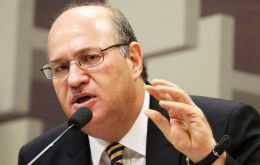MercoPress. South Atlantic News Agency
Stories for 2016
-
Monday, October 10th 2016 - 23:28 UTC
Brazil's economy could again rank eighth world largest next year, says IMF

Brazil's economy is expected to return to growth next year and with a decrease in the value of the dollar vis-a-vis the Real in recent months, the country is back on track to becoming the world's eighth largest GDP in 2017 according to the IMF. Since last year, Brazil has been ranked ninth (2 positions below its ranking in 2014) due to the recession that started at the end of 2014.
-
Monday, October 10th 2016 - 23:13 UTC
Global debt reached 225% of world GDP; concern with private debt buildup in China and Brazil

The world is swimming in a record US$152 trillion in debt, the IMF said on Wednesday, even as the institution encourages some countries to spend more to boost flagging growth if they can afford it. Global debt, both public and private, reached 225% of global economic output last year, up from about 200% in 2002, the IMF said in its new Fiscal Monitor report.
-
Monday, October 10th 2016 - 19:03 UTC
FAO September food price index 10% higher over a year ago; dairy prices up 13.8% in a month

The FAO Food Price Index averaged 170.9 points in September, up 2.9% from August and 10% from a year earlier. The increase was driven by a 13.8% monthly jump in the FAO Dairy Price Index, partly as a result of a sharp jump in butter prices benefiting exporters in the EU, where dairy output is declining.
-
Monday, October 10th 2016 - 18:57 UTC
Airline industry agrees to significantly reduce jetliners carbon emissions

The airline industry agreed on a framework for reducing its carbon footprint at a UN meeting in Montreal, the first commercial sector on its own to tackle climate change. Six years of negotiations culminated in what International Civil Aviation Organization president Azharuddin Abdul Rahman called a “historic” deal at the ICAO's plenary session to cap carbon-dioxide emissions by 2035 at 2020 levels.
-
Monday, October 10th 2016 - 11:49 UTC
Combating inflation and austerity reforms Brazil central bank's priorities

Brazilian central bank chief Ilan Goldfajn said policymakers have no set time frame to cut interest rates, even as industrial data suggested that Latin America's biggest economy may take longer than expected to emerge from recession.
-
Monday, October 10th 2016 - 11:38 UTC
Record global productions of wheat, rice and corn will keep prices low

Global food markets will likely remain “generally well balanced” in the year ahead, as prices for most internationally-traded agricultural commodities are relatively low and stable, FAO said. The benign outlook, especially for staple grains, is poised to lower the world food import bill to a six-year low, according to the Food Outlook.
-
Monday, October 10th 2016 - 10:35 UTC
Fed vice chairman sees the anti-globalization political speech as main threat to trade and growth
![”What worries me about the anti-globalization [view] is the view that globalization is useless and we ought to be back and worry about ourselves,” said Fischer.](/data/cache/noticias/56782/260x165/fischer.jpg)
Federal Reserve Vice Chairman Stanley Fischer said a rising tide of opposition to international trade and integration threatens global growth. Global trade this year will grow at the slowest pace since 2007, according to the World Trade Organization.
-
Monday, October 10th 2016 - 10:26 UTC
US economy in September creates jobs at a slower pace: more people looking for work

The US economy created 156,000 jobs in September, official figures show, slightly fewer than expected. However, August figure was revised higher to 167,000 from 151,000. Both figures are lower than 180,000 average for this year. The unemployment rate edged up to 5% from 4.9%, although that was due to more people looking for work.
-
Monday, October 10th 2016 - 10:14 UTC
Brexit controversy: UK major business call on PM May to preserve free trade with Europe

A group of major business lobby groups has written an open letter urging the United Kingdom government to preserve barrier free trade with Europe. The letter is signed by leaders of the Confederation of British Industry, CBI, and manufacturers' body the EEF.
-
Monday, October 10th 2016 - 09:46 UTC
Haiti: 1.000 dead and counting, and first cases of cholera; three days official mourning

Matthew, meanwhile, lost its hurricane status, subsiding to a “post-tropical cyclone” after cutting a swath from Florida to South Carolina in United States. Matthew crashed ashore on Haiti’s southern coast on Tuesday as a monster Category 4 storm, packing 230 km winds.
